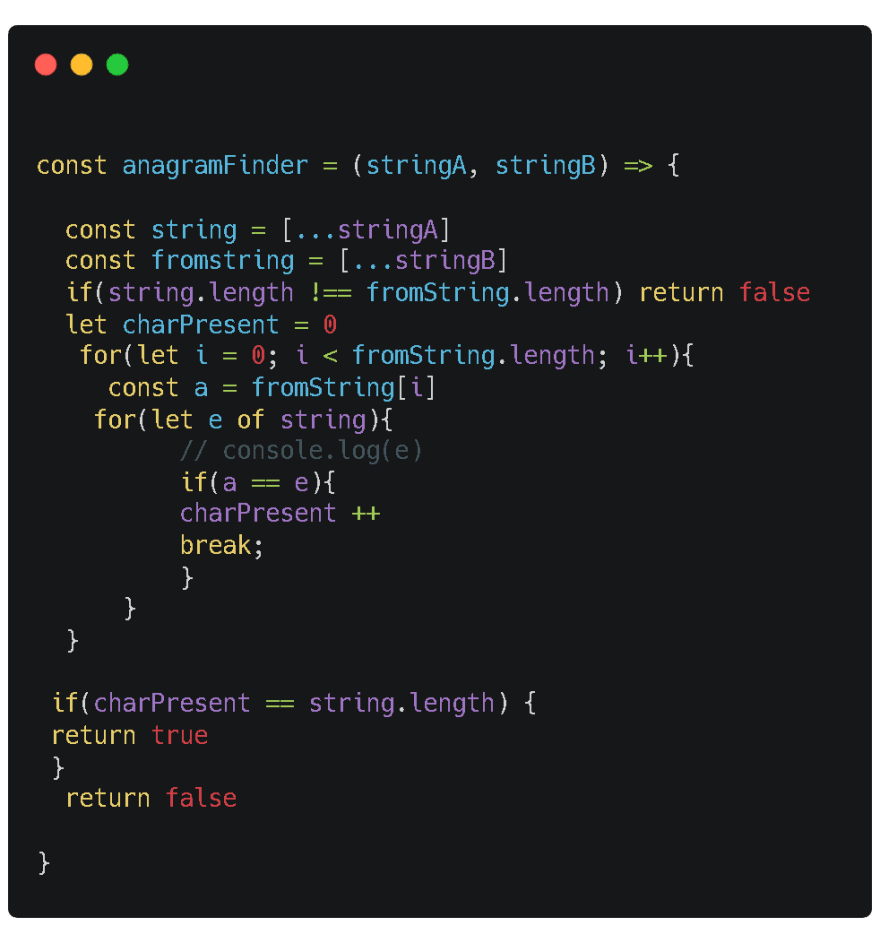I started a series on JavaScript solutions to common algorithms and javascript problems. In case you missed the first one, here's a link to it. Earlier this week, I wrote an article on the Big O notation. If you are not familiar with it, you might want to read it as some concepts are used in this article. Let's go straight to the problem statement.
Finding Anagrams - the problem
Anagrams are words that have the same characters in the same quantity. This means that two strings are anagrams if we can rearrange one to get the other.
Here are some examples of words that are anagrams.
- “listen” and “silent”
- “rail safety” and “fairy tales”
- “dormitory” and “dirty room”
- “the eyes” and “they see”
To solve this problem, we will assume the following:
- That we ignore extra characters like “!”, “@”, etc. and whitespaces.
- We only want to work with lowercase characters.
Let us look at some solutions to this problem. Then we'll compare each of them based on their time complexity.
Solution 1 - Create a character map of both strings and compare maps
A character map in this context is a map or object that contains each unique character in the string. It stores the character as a key and the number of times it occurs in that string as the value.
function anagrams(stringA, stringB) {
/*First, we remove any non-alphabet character using regex and convert
convert the strings to lowercase. */
stringA = stringA.replace(/[^\w]/g, "").toLowerCase()
stringB = stringB.replace(/[^\w]/g, "").toLowerCase()
//Get the character map of both strings
const charMapA = getCharMap(stringA)
const charMapB = getCharMap(stringB)
/* Next, we loop through each character in the charMapA,
and check if it exists in charMapB and has the same value as
in charMapA. If it does not, return false */
for (let char in charMapA) {
if (charMapA[char] !== charMapB[char]) {
return false
}
}
return true
}
function getCharMap(string) {
// We define an empty object that will hold the key - value pairs.
let charMap = {}
/*We loop through each character in the string. if the character
already exists in the map, increase the value, otherwise add it
to the map with a value of 1 */
for (let char of string) {
charMap[char] = charMap[char] + 1 || 1
}
return charMap
}
The runtime complexity of a for loop is linear i.e O(n). In this case, there are 3 consecutive forloops which are not nested. Ignoring constants and other factors, the time complexity is approximately linear i.e. O(n).
2. Sort Strings and check if they are the same
This is a shorter and neater way of checking if two strings are anagrams.
In this case, we convert the string to an array, use the Array.sort()
method to sort it and convert it back to a string. Then we compare both strings and check if they are the same.
function anagrams(stringA, stringB) {
/*First, we remove any non-alphabet character using regex and convert
convert the strings to lowercase. */
stringA = stringA.replace(/[^\w]/g, '').toLowerCase()
stringB = stringB.replace(/[^\w]/g, '').toLowerCase()
return sortString(stringA) === sortString(stringB)
}
/*This function sorts the strings*/
function sortString(string) {
return string.split('').sort().join('');
}
Array.sort uses merge sort so its time complexity is O(nlogn).
3. Using Array.splice()
This is yet another solution. In this case, we convert string B to an array, loop through each character in string A and check if it exists in an array of string B, arrB. If it exists, we use the Splice method to remove it from the array. We do this so that characters that occur more than once in arrB are not checked twice.
function anagrams(stringA, stringB) {
/*First, we remove any non-alphabet character using regex and convert
convert the strings to lowercase. */
stringA = stringA.replace(/[^\w]/g, '').toLowerCase()
stringB = stringB.replace(/[^\w]/g, '').toLowerCase()
/*Next, we check if the lengths of the strings are equal.
If they are anagrams, they will have the same length. */
if (stringA.length !== stringB.length) {
return false
}
let arrB = stringB.split("")
for (let char of stringA ){
if (!arrB.includes(char)) {
return false
break;
} else {
arrB.splice(arrB.indexOf(char), 1)
}
}
return true
}
So let's consider the time complexity of this solution. In this case, there are three loops that run. The for loop, the includes loop and the splice loop. Since the splice loop and the includes are not nested, the time complexity tends to O(n^2 ).
Conclusion
We have seen the solutions and their approximate time complexities. Comparing their time complexities, the first solution seems to have better performance. It has an approximate time complexity of O(n). The second solution, however, is more concise. So you can choose any solution depending on what is more important to you.
Got any question or addition? Please leave a comment.
Thank you for reading.





















This is a favorite interview question of mine. The character map solution is what most people seem to do - myself included!